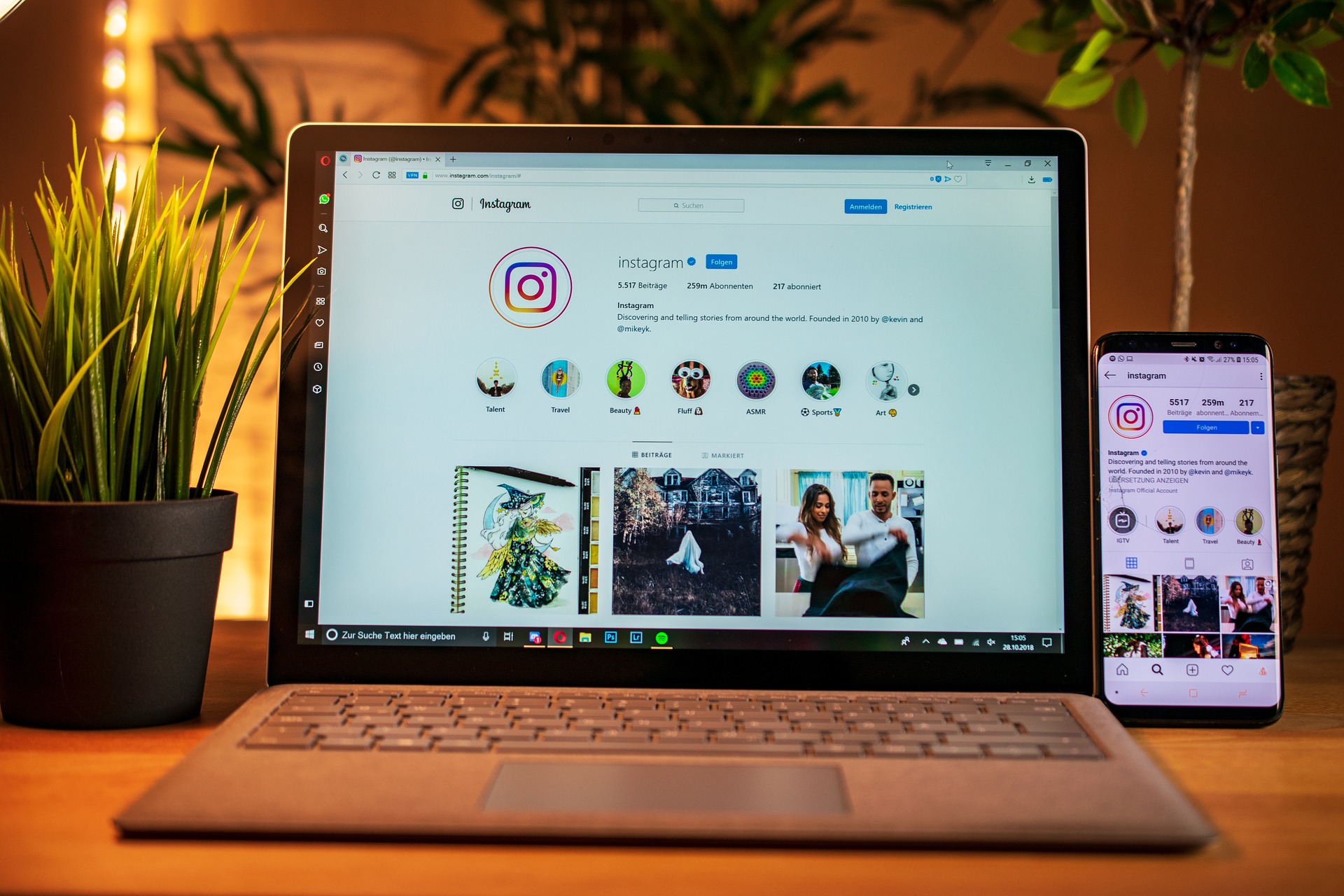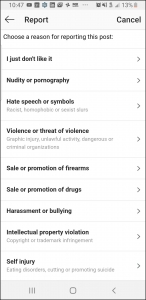Is Instagram unintentionally inviting censorship? I wrote an article outlining a new post reporting option Instagram will debut at the end of August 2019. Labeled “false information”, with the unveiling this option, Instagram has declared war on the number of scams and “misinformation” being shared unknowingly, unwittingly, by its community. By including a “nuclear option”, if you will, Instagram is encouraging its community to tag posts they feel fits this moniker, thereby putting the burden of proof on the user who created the post. The poster would not know who tagged his or her post as “false information” (the new option), and may not know it was tagged unless and until contacted by Instagram. In some cases, the violation may be severe enough to warrant the post’s immediate removal without contacting the owner!
What, exactly, is “misinformation”? Before reviewing the process of using this new option as well as the other available options (which should work on both mobile and desktop environments), a quick review of these terms may be helpful (thank you to Merriam-Webster for these definitions):
- inappropriate: unsuitable. This can be language, images, or behavior interpreted through replies to users’ posts. The first known use of this word was recorded in 1804.
- spam: unsolicited usually commercial messages (such as e-mails, text messages, or Internet postings) sent to a large number of recipients or posted in a large number of places. Not exactly “mystery meat”! Usually the identified culprit in this crime is email; however, could this extend to unsolicited sales (or other) messages, occurring either after you have followed someone or someone has asked to contact you? Yes, it could! The first known use of this word was recorded in 1990 (as a noun) and 1994 (as a verb).
- misinformation: incorrect or misleading information. Since some posts are sponsored (ads) while most are informational or fun, a post could be an attempt to mislead you to believe something contrary to a popular conversation, opinion, or concept. The first known use of this word was recorded in 1605.
So, if I report a post as “inappropriate”…
… a list of nine (9) options to choose from comes up in a sub-menu (see image below). Please, take great care in assigning these to a post, as someone can likely report one of your posts for any of these reasons as well. Before I continue, I’d like to give a HUGE THANK YOU to my friend, Cherie (@paizleygrl) for allowing me to use one of her posts for my blog article – thanks, Cherie! Now, let’s walk through these quickly:
- I just don’t like it. Fine. I don’t like everything I see on Instagram, to be brutally honest, so why was it necessary to create this selection? Don’t waste valuable engagement time on this option. SOCIAL MEDIA TIP: If you don’t react to it, you probably didn’t see it as worthy of commentary, including the heart icon.
- Nudity or pornography. This one is very understandable, especially where children are concerned — either a child seeing it or being victimized by it — but, could be subjectively interpreted. For example, back in March this year, singer/music artist Pink was subjected to a lot of hate comments on her Instagram – why? Because she posted a picture of her and her two children chillin’ next to a pelican, and she didn’t realize her youngest had decided he’d had enough of the swim diaper. She deleted her post, scribbled over her son’s penis, and wrote a rather angry (deservedly so IMHO) defense of the original photo. The takeaway: don’t be quick to judge – that could be you.
- Hate speech or symbols. Symbols are probably more reasonable for this than the speech part. In the United States, whether or not we like it and whether or not it is agreed that it exists, hate speech is protected by the 1st Amendment. It’s awful, agreed, but protected. The takeaway: Just because someone has the right to say it doesn’t mean we HAVE to react to it.
- Violence or threat of violence. I don’t often see anything like this outside of news outlets or posts on other social media channels, but that doesn’t mean it’s not happening. What looks like violence or a threat to some could be nothing more than a “training” exercise.
- Sale or promotion of firearms. This one bothers me because there are people who like to hunt, and usually, they upload a post with the game and their weapon. There are people in the antique business who collect old firearms and post them to show off a new acquisition. That doesn’t necessarily mean the post is promoting the firearm or sale of it; it could be someone is proud of their purchase and wanted to share. What was the meaning of the post, the context? The intent?
- Sale or promotion of drugs. Should this apply to PillPack or cheapdrugs.discount? Both seem to promote the service, but obviously, their service is legal prescription drugs. It might seem like it’s obvious — Instagram wants illegal drugs not promoted — but, could someone be offended enough by these companies to turn them in?
- Harassment or bullying. Pretty obvious in my opinion.
- Intellectual property violation. I’ve worked in the graphic design industry for over 20 years, and I’ve seen numerous ”violations” of a company’s or brand’s intellectual property (i.e., logo, photos, fonts, documents, etc.) get hijacked – even a friend of mine in Scotland was subjected to this about a decade ago. How does the viewer know the poster didn’t get written permission to use the logo or image? Does this mean Google shouldn’t return images of logos and other intellectual property as a search result from companies we research so we’re not tempted to use them? Before you say, “Oh, I’d never use a photo from Google as my own!”… it does happen, usually as something so innocent as a placeholder for a different image.
- Self-injury. Another pretty obvious option in my opinion.
- False information. This option will be added shortly, though some Influencers are seeing it early. In my opinion, this one is the most dangerous of all because it has the power to become weaponized into censorship, diametrically opposite of free speech. How?
- Who decides what is and isn’t false information? It should be individual Instagram users, but, we all read things differently.
- What criteria is being used to make this decision? Free speech with criteria isn’t free speech, IMHO.
- Does the tagged user have an option to get out of “Instagram jail”? I don’t know if there is such a thing, but, what happens to the account that gets flagged repeatedly?
- What if a false or incorrect report is made? Does Instagram post an “I’m sorry” or “Instagram regrets the error…” for all to see?
This option puts all Instagram users (and users on other social media platforms) at risk for their posts being deemed “false” and having to prove otherwise. I also don’t think it’s a coincidence this option is being presented nearly 14 months before the next presidential election, either. Should posts be vetted and policed by Instagram itself? No, they don’t honestly have the time, and Facebook has proven their own algorithms aren’t completely reliable. Should individual users vet others’ posts? Maybe, but it treads on shaky ground. Does this then mean we have to title each and every op-ed or satire post as such? Maybe. We are allowed our opinions, whether we’re right or wrong; whether or not someone likes the opinion(s) is up to each individual to decide.
Here’s another not-so-great thought: if your business is using Instagram, what stops your competitor(s) from invoking this “false information” tag on one of your posts? Not only could that potentially harm sales, but such a tag could also jeopardize your business’ reputation and your Instagram account. What recourse would business owners be able to pursue?
Just food for thought. In my opinion, this is definitely one option Instagram should not invoke.
How to report a post
- Find a post you want to report. Click or tap the three dots in the upper right-hand corner of the post.
- Click or tap “Report…”.
- Choose a reason for reporting the post: a) it’s spam, or b) it’s inappropriate.
- If you tap “it’s inappropriate”, you will be taken to another screen with the option “False Information” being an option (again, as of the end of August).
Can you “unreport” a post?
Only if the post was reported using the “Intellectual Property” tag. The best way to remove this is to send an email to ip@instagram.com and reference the original report number. I couldn’t find anything else within Instagram’s knowledgebase about withdrawing a report on a post; hopefully, Instagram will include this function in the near future.
- Find a post you want to report. Click or tap the three dots in the upper right-hand corner of the post.
- Click or tap “Report…”.
- Choose a reason for reporting the post: a) it’s spam, or b) it’s inappropriate.
- If you tap “it’s inappropriate”, you will be taken to another screen with the option “False Information” being an option (again, as of the end of August).
Hey, Instagram, here’s a suggestion!
Personally, I would like to see “Hide Post” as a selection from the dots by each post. Sure, it’s an option used on Facebook posts, but, since Facebook bought Instagram in 2012, I’m sure the programmers could work this into the selections. You have the option to Mute a post or story you don’t want to see. Muted stories don’t automatically play and don’t have the special colorful ring around it when it’s updated. You can also unfollow the person, business, public figure, or brand.
NOTE: This post was not intended to slight, anger, or point toward any political position; only the perceived idea of or intent by Instagram behind this set of “options”, in particular, the newest. Please be careful and cautious when using any of these selections. One day any of these options could be applied to your posts, your thoughts or insights, simply because someone didn’t agree or like what you posted. Silencing what we could learn from, no matter the viewpoint, would be a shame on us all.
Be strategic. Be visible. Be found.
Looking for content strategies for blogging or vlogging? Click here and let us know how we can help you.
Hashtags: #marketing #smm #instagrammarketingstrategy #smallbusiness #contentmarketingstrategy #socialmedia #visiblymedia










